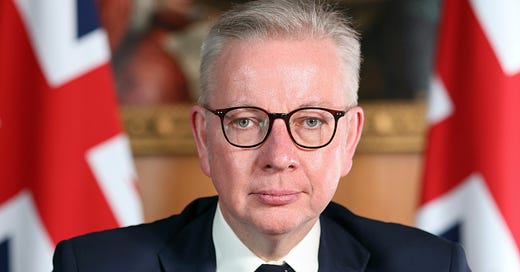We cannot fight extremism with censorship
Michael Gove's new definition of extremism is a threat to freedom - we need more speech, not less, to fight anti-Semitism.
What should the government do about rising anti-Semitism and Islamist extremism? Since the 7 October pogrom by Hamas, the simmering prevalence of Jew hatred has exploded into open expression on UK streets. The government vowed to take action, and its much-anticipated changes to the definition of extremism were announced this morning, to some confusion. Instead of a whole-scale legal tightening of what is considered extremist - and potentially illegal - Michael Gove hit the airways this morning to explain that the rules were changing, but only in relation to which groups receive government funding or sponsorship. The new definition would help the government get better at ‘choosing our friends wisely’, he said.
The previous definition of extremism under the 2011 Prevent Strategy described it as ‘vocal or active opposition to fundamental British values, including democracy, the rule of law, individual liberty and mutual respect and tolerance of different faiths and belief’. The government claims that the new definition will ‘narrow’ to help tackle the rise in Islamist extremism. It now reads: ‘The promotion or advancement of an ideology based on violence, hatred or intolerance’ which would aim to ‘negate or destroy the fundamental rights and freedoms of others’ or ‘undermine, overturn or replace the UK’s system of liberal parliamentary democracy and democratic rights’.
It doesn’t really matter that the new rules don’t create a new criminal offence - the expanding definition of extremism will have a chilling effect on freedom of speech. Last week, Gove promised that those who ‘seek to radicalise individuals, deny people their full rights, suppress freedom of expression, incite hatred and undermine our democratic institutions’ will be targeted by new announcements. What ‘inciting hatred’ or ‘undermining our democratic institutions’ means is anyone’s guess - and a worryingly broad definition given the hostile attitude to freedom of speech today. The government seems aware of this criticism, trying to calm concerns about censorship by announcing that the new rules will not apply to ‘debate within the boundaries of mainstream discourse’. But from the experience of censorship during the lockdown periods to clampdowns via the Online Safety Bill, we should take issue with the government deciding what is considered ‘mainstream’, and legitimate, and what is not.
Many people are sick of seeing displays of open anti-Semitism and Islamism on UK streets - often displayed on pro-Palestine marches. Expressing naked Jew hatred has become an excusable tenet of opposing Israel’s actions in Gaza, not just for Islamist sympathisers wearing pro-Hamas headgear, but for the latte-clutching middle classes who sing ‘Yemen, Yemen, make us proud! Turn another ship around’ in support of the Houthis. It is right that many of us - including the prime minister, Rishi Sunak, in his speech earlier this month - feel that something must be done to counteract these ugly scenes. It’s no longer adequate to leave the fight against anti-Semitism up to security guards hired to stand outside schools in Stamford Hill. After suffering years of excuses and blind eyes being turned to the issue of anti-Semitism, it is understandable that many want to see concrete action to put an end to it. But the answer to hateful and even threatening or intimidating speech should always be more speech, not less.
Defending free speech
We cannot give up freedom of speech in our battle against Jew hatred - and this is not just because of a commitment to an abstract principle. Free speech is our greatest weapon in the current clash of civilisations we are facing. Some think the only way out of this mess is to arrest, deport and drive underground the problems of anti-Semitism. But the irony is that this approach is itself an evasion of having these arguments out in full view, a cowardly avoidance of confronting difficult issues. It’s the mirror image of those who want to ban any talk of Islamism by calling it Islamophobia. It simply drives the problem away from the realm of public discourse.
Politicians like Suella Braverman have called for the restriction of marches - even outright bans - as well as tougher powers for the police to arrest and detain people seen to be engaging in anti-Semitic acts. When Rishi Sunak was asked whether waving Palestinian flags was a matter for the police, he replied ‘people who are acting in an abusive or threatening manner causing distress are breaking the law’.
The idea that simply locking up protesters or locking down London streets will solve the problem of anti-Semitism is misguided. During his speech on Islamism, Sunak promised a hardened approach to the Prevent programme, with promises to clampdown on universities hosting Islamist speakers. But we know that Prevent doesn’t work. Terrorist attackers Khairi Saadallah, Sudesh Amman and David Amess’s murderer, Ali Harbi Ali, all committed their crimes after being processed by the Prevent programme. As the writer Daniel Ben Ami argued in his Letter on Liberty: Rethinking Anti-Semitism, ‘history shows us that simply banning bigoted views (or hiding them from public view) doesn’t make them go away’.
More importantly, we cannot rely on technical fixes for what is a deep and complex cultural problem. It has become clear that Islamist extremism has found fertile ground among a section of the British Muslim community - evidenced in the flareups at Batley Grammar School or outside Cineworld in Birmingham. The accusation of Islamophobia has prevented proper scrutiny of why extremist ideology has sometimes been given a free pass - the teacher in Batley is still in hiding.
Thanks to a lack of courage in talking about these issues openly, politics is in danger of becoming ugly and sectarian. Despite the problems of the ‘Islamophobia’ label, anti-Muslim bigotry is no myth. In response to the problem of Islamism, some on the right have sought to blame the Muslim community as a whole - ironically mirroring the anti-Semitic claims that all Jews are answerable for Israel’s actions. It is ridiculous to suggest that Muslims must answer for Hamas’ actions - most not only disagree with the tenets of Islamic fundamentalism, but enjoy and espouse the kind of freedoms that Islamists would condemn them for. Sunak might think the government going harder on its Prevent strategy in universities is a good idea, but many Muslim students think otherwise. The majority of Muslims living in the UK have no interest in ISIS or Hamas. And yet, the process of identifying those deemed to be ‘at risk’ of extremism has meant that innocent, ordinary Muslim students have been harassed or investigated - simply for being Muslim.
Others seem to think the solution to our problems is a reliance on law and order. They have no problem with the government reaching for further restrictions on freedom of expression - viewing the means as justifying the end of flushing anti-Semitism from public view. They cannot see the danger in allowing a state to clamp down on the freedoms of its citizens to dissent and disrupt - even when that takes abhorrent forms. They cannot understand that what constitutes ‘extremist’ and ‘dangerous’ in the eyes of a government with no freedom-loving instinct might be used to fight anti-Semitism today, but broadened out to include any other issue tomorrow.
Understanding tolerance
The word ‘tolerance’ is much misunderstood - many seem to think it means singing Kumbaya in the face of bigotry and hatred or turning the other cheek. But tolerance is not a passive act - it does not mean ignoring the things we disagree with. Tolerance means that we allow people to express their views, in the knowledge that they remain open to criticism, scrutiny and condemnation. To live in an intolerant society is to give up on the idea that people’s minds can be changed - that argument, persuasion, debate and democracy can be used to win the battle of ideas for a genuinely progressive and free society.
Many have criticised the police’s inaction at pro-Palestine marches - especially when protest crosses over into violent action and intimidation. But what we need is not more laws and more police - indeed, if anyone had any faith in the Metropolitan Police being trusted to protect freedom of speech, they should watch the treatment of Niyak Ghorbani, who was wrestled to the ground and arrested for holding a sign that said ‘Hamas is terrorist’. Instead, what we need is a bigger public outcry against anti-Semitic sentiments. If you join those marches because you are concerned about Palestinian self-determination, or appalled by the death toll in Gaza, it is your duty to self-police the movement you are joining. You must challenge those with anti-Semitic depictions of Netanyahu, give those belittling the Holocaust a history lesson and call out anti-Semitism wherever you see it. The fight against anti-Semitism is not just a Jewish one - we must all do what we can to stand in solidarity against the oldest hatred.
Standing up for democracy and liberty
Some people have been squeamish about terms like ‘barbarity’ and ‘civilisation’ - suggesting that there is little discernible distinction between Israel, or our country and government, and the likes of Hamas or Hezbollah. But we are different - and not just that, we must assert what makes us better. Many of the young anti-war activists you see on the marches seem ignorant of the threat Islamism - and its ugly twin, anti-Semitism - poses to the freedoms they enjoy, like the right to protest. Dressed in the garb of decolonisation and social justice, they betray the aspirations for democratic rights and self-determination by handing over those Western values to theocratic bigots. We need to ensure we do not betray those values, too.
It is not simply that we don’t commit and condone barbaric acts like weaponised rape, murder and hostage taking, but that we truly believe in a free and tolerant society. We defend the freedom of individuals to live their lives as they see fit - from sexual liberation to religious freedom. We don’t kill or suppress our political opponents, we defend democratic argument. This doesn’t mean going soft on hateful views, but challenging them in the open, winning the argument and bringing people along with us.
British Jews have movingly revealed the fear and hurt they feel being exposed to open anti-Semitism. This should not be ignored or downplayed - we must stand in solidarity with them. If we believe in Western values - freedom, tolerance, democracy - we must be willing to defend them without caveat. That means resisting the desire to seek quick and ineffective fixes - like rash government announcements on extremism. In order to win this cultural battle against those who hold freedom in contempt, we must have the courage of our convictions and resist the easy option, to ban what we find abhorrent.
Social norms are not created or changed by court rulings or deportation orders. We cannot be lazy or cowardly - we have to take the arguments against anti-Semitism to the streets. Countries all over the world will be going to the polls in this election year, and Western democracies will be put to the test. We must defend what we hold dear, and stand up for freedom of speech - it is what makes us human in the face of barbarism.
Early-bird tickets are now available for the Battle of Ideas festival 2024, which will take place at Church House, Westminster on Saturday 19 and Sunday 20 October. Get your tickets here.







